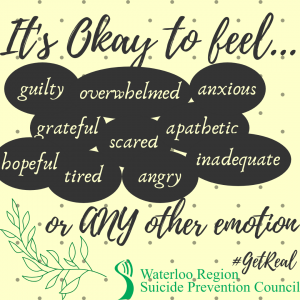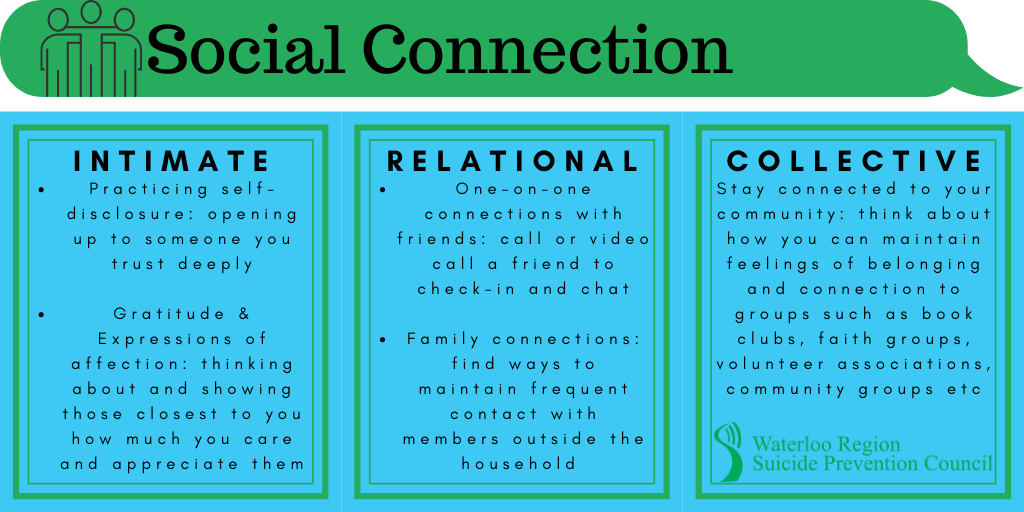This year, CMHA’s annual mental health week has the theme of Social Connection, and encourages people to #GetReal about how they really feel. Watch this video from WRSPC ED Elisa Brewer-Singh talking about Mental Health Week 2020.
At the WRSPC, we know that it is important to have social connection and to #GetReal when it comes to suicide. We wanted to emphasize the importance of three different ways you can #GetReal for suicide prevention: #GetReal with yourself, #GetReal with others, and #GetReal with mental health professionals.
#GetReal with Yourself
“Emotional Intelligence” can be thought of as a persons ability to accurately identify and express their emotions, to understand those emotions, and to regulate those emotions. Researchers have determined that there seems to be a link between emotional intelligence and suicide, with high emotional intelligence protecting against suicidal behaviour1. This means that an important part of suicide prevention is learning to recognize, share, and cope with emotions – to #GetReal with yourself about what you are feeling.
It is important to acknowledge and express how we really feel. It is okay feel a wide range of emotions, it is okay for your emotions to fluctuate day to day or minute by minute, and it is important to acknowledge and listen to our emotions even when they aren’t as pleasant. Emotions are not good or bad, and when we get real about how we really feel, we fuel real social connection.

Helpful Resources:
WRSPC’s Feelings Wheel – this feelings wheel graphic (Credit: Dr. Gloria Wilcox) can be something to refer to if you are having trouble expressing or understanding what you might be feeling in a given moment. Give it a try – take a look through the wheel, and try to choose a word or two to describe what you might be feeling right now.
WRSPC’s Signs of Stress – sometimes, we may not even realize that we’re feeling stressed or experiencing negative emotions. Getting real with yourself can involve learning what your signs of stress are, or what your ‘tells’ are that you are experiencing emotional distress.
The Greater Good Science Center: “How to Be Kinder To Yourself” – As we’re learning to get real with our feelings, this is a great time for a reminder about self-compassion and how to practice it. This video from the Greater Good Science center, narrated by an Active Duty Military Psychiatrist, walks us through a science-based practice for self-compassion when we experience stress or difficult emotions that can help us to get real with ourselves, without dwelling and getting down on ourselves.
#GetReal with Others
Social Connectedness has also been studied in relation to suicide, suggesting that positive involvement with friends, family, and social groups can lessen suicidal ideation2. Getting real with others you trust through self-disclosure (opening up to those close to you about your struggles), could help boost closeness as well as giving you an opportunity to share your struggles with someone who can listen. Some researchers have suggested three dimensions of social connection: Intimate Connectedness, Relational Connectedness, and Collective collectedness3. Here’s some ideas for boosting each of these three forms.

Another important way to #GetReal with others is to check-in when you think someone might be struggling. Being close with someone might help you notice when their behaviour seems off or strange in a way that might be a warning sign they are thinking about suicide. These warning signs can also be thought of as invitations to help, or to have an open and honest conversation with your friend about how they are doing, which may involve asking about suicide.
Helpful Resources:
Mental Wellness Network of Waterloo Region: “Connect” – The MWNWR has developed a ‘ways to wellbeing’ framework including 5 evidence-based ways to promote wellness. One of their ways is ‘connect’, and this page lists resources for building social connection.
WRSPC’s “Suicide Alertness During Covid-19” – a graphic containing risk factors, warning signs, and protective factors for suicide created specifically focusing on factors that may be more relevant during the COVID-19 pandemic. Learning these warning signs and others listed on the WRSPC website here may help you to recognize these in a friend.
Centre for Suicide Prevention’s “A Caring Conversation: What Suicide Prevention Can Look Like” – this is a great resource providing guidance on how to have a conversation with a friend that you think might be struggling.
LivingWorks “START” – Liwingworks, the creators of the SafeTALK suicide alertness and ASIST suicide intervention trainings, have now created an online suicide awareness training program that teaches you how to recognize, talk to, and get support for a friend who you think is struggling with thoughts of suicide. During the COVID-19 pandemic it is being offered at a discounted rate of $20CAD using coupon code “COVID19”.
#GetReal with Mental Health Professionals
Now we’ve learned to get real with ourselves to acknowledge and face our emotions, and to get real with others to have honest conversations when you or they are struggling. Now what? Sometimes, we face emotions that are heavy, difficult, chronic, or intense, and handling them alone or with our informal support systems such as friends and family isn’t enough. If you are noticing signs of distress in yourself, are struggling with difficult emotions, or are thinking about suicide, the best help can come from trained mental health professionals. If you’ve gotten real with a friend and they’ve told you they’re experiencing any of that themselves, encouraging them to talk to a professional is a great way to help them. We are fortunate to have many great resources locally and across Canada available to anyone needing support, and accessible in different ways like phone, texting, and online. In a crisis situation where you or a friend are in immediate danger, it’s best to call 9-1-1 or access your nearest emergency department.
Resources:
WRSPC’s “Getting Help” – a page with information and encouragement on how to build your team & get help when you need it.
WRSPC’s “Maintaining Mental Wellness During COVID-19” – this is a list of resources available in remote/virtual formats that was compiled during the COVID-19 pandemic, but all resources are accessible at any time.
CMHA WW’s “Here4Help” – A new web-based portal created by CMHA WW to assist individuals in the time of the COVID-19 pandemic, this site includes self-help information as well as information on how to access support from mental health professionals.
Mental Health Commission of Canada: “Wellness Together Canada” – A web-based resource free for all Canadians included wellness assessments, self-guided resources, community support, and access mental health professionals via text or online chat.

References:
1 Domínguez-García, E., & Fernández-Berrocal, P. (2018). The Association Between Emotional Intelligence and Suicidal Behavior: A Systematic Review. Frontiers in psychology, 9, 2380. https://doi.org/10.3389/fpsyg.2018.02380
2 Mellqvist Fässberg, Madeleine & Orden, Kimberly & Duberstein, Paul & Erlangsen, Annette & Lapierre, Sylvie & Bodner, Ehud & Canetto, Silvia & De Leo, Diego & Szanto, Katalin & Waern, Margda. (2012). A Systematic Review of Social Factors and Suicidal Behavior in Older Adulthood. International journal of environmental research and public health. 9. 722-45. 10.3390/ijerph9030722.
3 Hawkley LC, Browne MW, Cacioppo JT (2005) How can I connect with thee? Let me count the ways. Psychol Sci 16: 798–804


